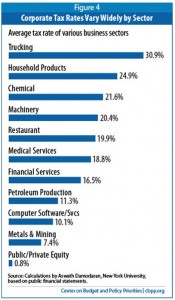 The current budget debate is stunning: we, as a nation, are negotiating only one side of the transaction. Everything is to be ‘balanced’ on the backs of individual citizens, while the plutocracy, Wall Street and private equity sit across the table, expecting to buy at foreclosure-sale prices the remaining 20% of the country they don’t already own. There’s a sound anthropological reason for this sorry situation. The French social scientist Pierre Bourdieu, famed for studying tribal culture, documented how tribal elders maintained power by defining and manipulating the ‘doxa’ or common belief, explained in his book “Outline of a Theory of Practice” as that which in the natural and social world appears self-evident, encompassing the limits of what can be thought or said.
The current budget debate is stunning: we, as a nation, are negotiating only one side of the transaction. Everything is to be ‘balanced’ on the backs of individual citizens, while the plutocracy, Wall Street and private equity sit across the table, expecting to buy at foreclosure-sale prices the remaining 20% of the country they don’t already own. There’s a sound anthropological reason for this sorry situation. The French social scientist Pierre Bourdieu, famed for studying tribal culture, documented how tribal elders maintained power by defining and manipulating the ‘doxa’ or common belief, explained in his book “Outline of a Theory of Practice” as that which in the natural and social world appears self-evident, encompassing the limits of what can be thought or said.
So we never put everything on the table, public and private, and see what America really wants. Journalism has drowned itself in a pureed sludge of opinion, factoids, cable-news posturing and baseless bloggadocio such that functional truths are unavailable even to experts in the field under discussion.
Thus, health care is never discussed in the philosophical context of our obligation to care for our fellow citizens, but is fought on a media-defined culture-war battlefield, where only the financial beneficiaries of the pre-Obamacare status quo will escape unwounded. Let’s consider Einstein and do a couple of philosophical thought experiments.
“What would happen if we outsourced our health care to Canada?” The usual initial response: “It could not happen.” But in Einstein’s thought experiments he didn’t ride in trams and elevators at light speeds, but used the concept to make a point. Voila: interesting discussion. For instance, outsourcing north of the border would provide universal coverage for about half of what we now spend while leaving many uninsured. What would we do with the savings, 7-9% of GDP? A few wealthy ‘health industry’ executives might suffer, but it would boost the economy, from which we all might benefit.
How about “taxing financial transactions and eliminating tax breaks for hedge fund managers?” As Warren Buffett notes, they pay lower tax rates than his secretary. As a broad philosophical concept, shouldn’t profits from non-productive trades be taxed higher, perhaps based on trading frequency? Its an old idea, supported for decades, recently by Paul Krugman and promoted in the UK with a hilarious video by famed British actor Bill Nighy. After all, many of the trades are done at light speed by computers with only a tiny fraction of traders accounting for over 70% of all transactions, often held only for seconds. While some Deficit Commission members might have privately considered the huge shift in tax liability from corporations to individuals since 1970, and wondered whether a financial industry that grabs 41% of all corporate profits is even sustainable, we saw virtually no public debate of these crucial points.
Philosophically, we should consider the IRS as the checkout counter at the supermarket of government services, where we pay for those that we collectively use. However, many of the large corporations pay an effective tax rate of zero, either butting into the checkout line with handfuls of corporate food stamps in the form of subsidies and tax breaks, or without regulatory enforcement, just plain shoplifting. For the most part, the media allows the claims that, at 35%, the US has the highest corporate tax rates go largely unchallenged. Responsibly, it should be pointed out that to omit the existence of multiple forms of tax exemptions turns the claim into a lie. Thus, we never get any widespread public discussion as to what level of tax contribution would be required by corporations and individuals to provide the government programs they enjoy.
Bourdieu saw TV’s role in manipulating public perception. Speaking of much earlier protests in Paris; “I would have worked up a demonstration in Paris—posters, a parade, we’d march to the Ministry of National Education. Today…barely an exaggeration…I’d need a savvy media consultant. With a few mediagenic elements to get attention—disguises, masks, whatever—TV can produce an effect close to what you’d have with 50,000 street protesters.” He asserts that such manipulation of perceptions lets TV make people believe there is a trend in one direction while the truth is the exact opposite.
Current events in Wisconsin show what happens when the power elite’s minions, Governor Walker and RNC Chair Reince Priebus, overstep their bounds and capabilities, behaving pettishly like something out of elementary school (parodied in the South Park episode, Dances with Smurfs, right down to media manipulation) Regardless of the outcome in Madison, it will not deter the power elites and their ongoing attempt to control the conversation. We must hope that the responsible media, the intellectual community and the unions stand up to the Koch brothers and their ilk.
C’mon U.S. media…. the country needs you, urgently.


Striking, pertinent, relevant! Not pureed sludge.
Your last comment sums it up. The US does need the media, but does it need them in their current form or an unbiased media?
Traditional media ratings are falling. People are hearing what they want to do and often the truth is hidden. There is a market for the truth. Several are taking advantage of it and once the others fail, they will too.